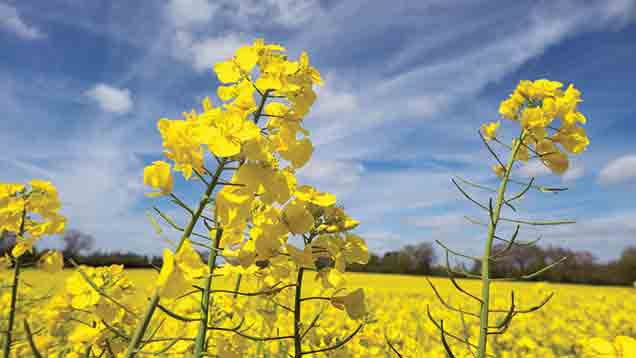Hellmann’s deal preserves profits for oilseed rape grower
 ©Tim Scrivener
©Tim Scrivener A guaranteed premium price and a secure market has encouraged Mark Bowsher-Gibbs to grow oilseed rape – with the rapeseed oil destined to end up in a jar of mayonnaise.
Turn a jar of Hellmann’s around and on the back the list of contents shows it is made up of 78% rapeseed oil, which comes from UK farms growing oilseed rape sustainably.
Mr Bowsher-Gibbs has just cut his fourth crop of nearly 1,000 tonnes destined for mayonnaise and is making a valuable £15/t premium at a time when rapeseed prices are languishing in the doldrums.
See also: The ins and outs of growing potatoes for a premier crisp brand
His 230ha crop on the north Kent estate he manages has just yielded an average 4t/ha, up from last season’s 3.7t/ha, and has the added bonus of the price premium.
“We were attracted by the guaranteed premium price and market security. It’s like a milling wheat premium, but knowing you are always going to get the premium,” he says.
The rapeseed contract is being offered by agribusiness group Archer Daniels Midland (ADM) for grower members of Linking Environment and Farming (Leaf) which encourages sustainable farming practices.
Processing
The rapeseed is crushed at ADM’s giant Erith plant, just up the road on the Thames estuary – which can process 1 million tonnes a year – and is then supplied to a plant at Purfleet in Essex owned by Hellmann’s owner Unilever.
Mr Bowsher-Gibbs is farm and estate manager for GH Dean, based at Hempstead Farm, just one mile east of Sittingbourne in Kent. The company was already a member of Leaf when it took on the Hellmann’s contract, as a condition of supplying food retailer Waitrose with apples, pears and cherries.
Fact file – Hellmann’s
- Unilever, one of the world’s biggest food group, buys about 120,000 tonnes of sustainably produced oilseed rape annually from UK growers for use in Hellmann’s mayonnaise and Flora margarine.
- This tonnage yields about 50,000 tonnes of rapeseed oil, which is then turned into Hellmann’s and Flora at its Purfleet plant in Essex.
- The Anglo-Dutch group, which also owns big food brands such as Knorr soups and PG Tips tea, is keen to source all its food products from sustainable agriculture around the world.
- The company is a major
buyer of agricultural commodities globally, and currently buys about 2% of the world’s output of rapeseed oil. - Agribusiness group Archer Daniels Midland (ADM) operates contracts with more than 100 Leaf-registered oilseed rape growers across the UK to supply rapeseed oil to Unilever. The company says it has enough contracted area for the 2016 harvested crop.
The estate runs to 1,750ha of fertile brick earth loams between the North Downs and Thames estuary, with 1,100ha of combinable crops and the rest made up of fruit orchards and grassland for sheep.
Leaf membership entails following best practices such as creating wildlife corridors and drawing up a conservation plan, but does
not mean any fundamental changes to the agronomy of growing oilseed rape.
Good farming
Carrie Jarvis, who oversees fruit supply contracts with the major supermarket chains, says the estate values Leaf involvement because it looks to encourage good farming.
“Leaf encourages you to think about farming practices and often helps save time and money – such as introducing trickle irrigation in the fruit crops,” she says.
However, the success story of growing oilseed rape for a clear end-user has not been able to survive the dramatic fall in the prices of rapeseed, and Mr Bowsher-Gibbs has almost halved his oilseed rape area for this coming season.
The average price of rapeseed sold off the farm from harvest 2014 was just over £310/t, but that had fallen from £362/t in 2013 and a high of £410/t at harvest 2012, he says.
This has shrunk the gross margin to £613/ha for the 2014 harvested crop from £1,023/ha the previous year, and well below the feed wheat level of £1,100/ha from the 2014 harvest.
“Oilseed rape has gone to the bottom of the pile in terms of returns, so we will simply be growing less oilseed rape, and more peas and beans,” he says.
Oilseed rape is a high-input crop. The annual variable cost is £482/ha with spending of more than £100/ha on herbicides – which is significantly higher than winter wheat costs of £425/ha, and a lot more than winter beans at £183/ha.
“Oilseed rape is a high-input crop with no short-cuts, so we will be down to about 140ha for this coming season,” he says.
Cut costs
The farm makes every effort to cut costs – by saving all its own seed on varieties such as Cabernet, Nikita, Campus and Trinity, and using a Sumo strip-till drill to establish the crop directly into wheat stubble.
Pre-emergence herbicides have been cut out in favour of early post-emergence treatments – again to trim cuts – with the aim of spending money on the crop only when it is established and out of the ground.
The crop is still a valuable break crop in the farm’s five-year rotation of two winter wheats, oilseed rape, winter wheat and then winter beans or spring peas, but economics have forced a rethink over how much is grown.

